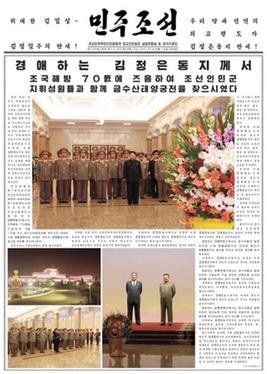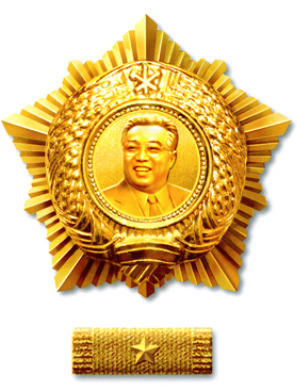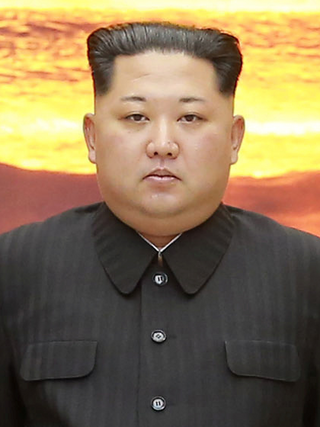
North Korea, officially the Democratic People's Republic of Korea (DPRK), is a country in East Asia. It constitutes the northern half of the Korean Peninsula and borders China and Russia to the north at the Yalu (Amnok) and Tumen rivers, and South Korea to the south at the Korean Demilitarized Zone. The country's western border is formed by the Yellow Sea, while its eastern border is defined by the Sea of Japan. North Korea, like its southern counterpart, claims to be the sole legitimate government of the entire peninsula and adjacent islands. Pyongyang is the capital and largest city.

Kim Jong Il was a North Korean politician who was the second supreme leader of North Korea. He led North Korea from the death of his father Kim Il Sung in 1994 until his death in 2011, when he was succeeded by his son, Kim Jong Un. Afterwards, Kim Jong Il was declared Eternal General Secretary of the Workers' Party of Korea (WPK).

Juche, officially the Juche idea, is the state ideology of North Korea and the official ideology of the Workers' Party of Korea. North Korean sources attribute its conceptualization to Kim Il Sung, the country's founder and first leader. Juche was originally regarded as a variant of Marxism–Leninism until Kim Jong Il, Kim Il Sung's son and successor, declared it a distinct ideology in the 1970s. Kim Jong Il further developed Juche in the 1980s and 1990s by making ideological breaks from Marxism–Leninism and increasing the importance of his father's ideas.

Rodong Sinmun is a North Korean newspaper that serves as the official newspaper of the Central Committee of the Workers' Party of Korea. It was first published on 1 November 1945, as Chŏngro, serving as a communication channel for the North Korea Bureau of the Communist Party of Korea. It was renamed in September 1946 to its current name upon the steady development of the Workers' Party of Korea. Quoted frequently by the Korean Central News Agency (KCNA) and international media, it is regarded as a source of official North Korean viewpoints on many issues.
The mass media in North Korea is amongst the most strictly controlled in the world. The constitution nominally provides for freedom of speech and the press. However, the government routinely disregards these rights, and seeks to mold information at its source. A typical example of this was the death of Kim Jong Il, news of which was not divulged until two days after it occurred. Kim Jong Un, who replaced his father as the leader, has largely followed in the footsteps of both his grandfather, Kim Il Sung, and his father. However, new technologies are being made more freely available in the country. State-run media outlets are setting up websites, while mobile phone ownership in the country has escalated rapidly. "There is no country which monopolizes and controls successfully the internet and information as North Korea does," said Kang Shin-sam, an expert on North Korean technology and co-head of the International Solidarity for Freedom of Information in North Korea, a nonprofit based in South Korea. North Korea has about four million mobile-phone subscribers circa 2022—roughly one-sixth of the population and four times the number in 2012, according to an estimate by Kim Yon-ho, a senior researcher at Johns Hopkins University's School of Advanced International Studies.

Kim Jong Un is a North Korean politician who has been supreme leader of North Korea since 2011 and the leader of the Workers' Party of Korea (WPK) since 2012. He is the third son of Kim Jong Il, who was the second supreme leader of North Korea, and a grandson of Kim Il Sung, the founder and first supreme leader of the country.

Jang Song-thaek was a North Korean politician. He was married to Kim Kyong-hui, the only daughter of North Korean premier Kim Il Sung and his first wife Kim Jong-suk, and only sister of North Korean general secretary Kim Jong Il. He was therefore the uncle of the current leader of North Korea, Kim Jong Un.

The Workers' Party of Korea (WPK) is the sole ruling party of the Democratic People's Republic of Korea, commonly known as North Korea. Founded in 1949 from a merger between the Workers' Party of North Korea and the Workers' Party of South Korea, the WPK is the oldest active party in Korea. It also controls the Korean People's Army, North Korea's armed forces. The WPK is the largest party represented in the Supreme People's Assembly and coexists with two other legal parties that are completely subservient to the WPK and must accept the WPK's "leading role" as a condition of their existence. The WPK is banned in the Republic of Korea under the National Security Act and is sanctioned by the United Nations, the European Union, Australia, and the United States.
The award system of the Democratic People's Republic of Korea was initially created less than one month after the foundation of the Republic. During the years of Japanese occupation of Korea, many of the future leaders fled to the Soviet Union. During World War II many if not close to all party leaders and Korean People's Army commanders served in the Soviet Army and as such adopted many of the Soviet awards criteria for their own. During the late 1940s and until the Sino-Soviet Split in late 1958, orders and titles were made in the Soviet Money Mints in Moscow or Leningrad. Soviet made awards were modeled after Soviet orders and made of sterling silver. Initially the orders were attached to clothing with a screw-plate, but after Soviet production stopped, production was moved to North Korea. The screwback was replaced with a pin and the silver content was replaced with cheap tin. With the exception of a few examples of modern orders, Soviet and Czech KPA awards are the most sought after in current militaria markets.

Minju Choson is a state-run North Korean government newspaper. It is published in Pyongyang. It was started in 1945. It is the principal newspaper of the Cabinet of North Korea and the Standing Committee of the Supreme People's Assembly.

Kim Jong Il was the Supreme Leader of North Korea from 1994 to 2011.
The People's Prize is a North Korean arts and sciences award. It is awarded by the People's Prize Awarding Commission, which is working directly under the Cabinet of North Korea. The prize can be granted to works of art or people. People's Prize has been an important award in the field of North Korean cinema.

Upon its liberation in 1945 and subsequent foundation in 1948, North Korea adopted national symbols distinct from the national symbols of South Korea. The traditional flag of Korea, the Taegukgi, and the symbol Taeguk, were swapped for socialist symbols.

The Order of Kim Il Sung (Korean: 김일성훈장) is the highest order of North Korea, along with the Order of Kim Jong Il, and only second to one honorary title, the Hero of Labour.

The Order of Kim Jong Il is a North Korean order named after Kim Jong Il, the former leader of North Korea. It is the highest order of North Korea, along with the Order of Kim Il-Sung, and only second to one honorary title, the Hero of Labour.
The Kim Il Sung Prize (Korean: 김일성상) is an award given by the Government of North Korea to persons in various fields who demonstrate exemplary service to the values of Juche idea. Past winners include the Korean composer Kim Won-gyun, judoka Kye Sun-hui, and the Arirang Festival.

Kim Jong Un has been the supreme leader of North Korea since the death of Kim Jong Il in 2011.

Chongnyon Jonwi is a daily newspaper in North Korea. It is the official organ of the Central Committee of the Socialist Patriotic Youth League. It is one of the three most important newspapers in the country, the other two being Rodong Sinmun and Joson Inmingun. Chongnyon Jonwi is particularly known for jointly publishing New Year editorials with the two papers under the rule of Kim Jong-il. Most of its regular articles are commentary on the contents of Rodong Sinmun from a youth perspective. The editor-in-chief is Choe Sun-chol.

Hwang Sun-hui was a North Korean politician who served in several high-ranking positions in the Workers' Party of Korea (WPK), including in the Supreme People's Assembly and the Central Committee of the WPK. She was affiliated with the Korean Revolution Museum from 1965, and was its director from 1990.
The Workers' Party of Korea Publishing House is the principal publishing house of the Workers' Party of Korea (WPK) and one of the two main publishers in the country. It publishes magazines and books on politics, such as the works of Kim Il Sung and Kim Jong Il, posters and works of fiction. The current director-general and editor-in-chief is Ri Yong-chol.
















